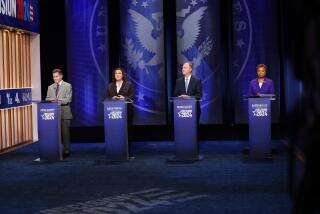Zschau Challenges Cranston to Debate Arms Control in Senate Race
- Share via
In a U.S. Senate campaign that has been lacking in engagement on the issues, Republican nominee Ed Zschau on Tuesday challenged his Democratic opponent, Sen. Alan Cranston, to a debate on arms control, the issue that Cranston has long made a centerpiece of his political career.
Speaking to the Commonwealth Club of San Francisco, Zschau praised President Reagan’s refusal in Iceland over the weekend to agree to a 10-year ban on all but laboratory research on the Strategic Defense Initiative, popularly known as “Star Wars.”
Zschau challenged Cranston to discuss the Iceland summit and other issues at a debate scheduled for next Sunday in San Francisco by the League of Women Voters.
‘Sharp Differences’
“We have sharp differences on (arms control) and other issues and I’m hopeful that Alan Cranston will agree to the remaining two debates the League of Women Voters has offered,” Zschau said.
Cranston, a three-term incumbent, slammed the door on debates with Zschau two weeks ago after Zschau aired TV ads that Cranston says misrepresent his record on drug enforcement and terrorism.
Cranston traveled the length of California on Monday for interviews and press conferences in which he expressed bitter disappointment at the lack of agreement at the summit. But he resolutely declined to fault the performance of the President, saying that both the United States and Soviet Union “seriously miscalculated” how far the other would go to achieve an agreement in Iceland.
“The losers are the people of the world, who awoke to a less safe environment,” Cranston said.
Zschau charged in his Tuesday speech that had President Reagan listened to Cranston in 1983 the President would never have seen the kind of arms reduction proposals that Soviet General Secretary Mikhail S. Gorbachev proposed last weekend in Iceland.
‘We Hung Tough’
“Sen. Cranston urged the President not to deploy the cruise and Pershing missiles in Europe in 1983,” Zschau said. “He said it would make the Soviets walk out on the arms talks. But we hung tough, we made the deployment, the Soviets walked out, but they came back, and you will notice that this past weekend Secretary Gorbachev proposed complete elimination of Euromissiles. He proposed deep reductions in offensive weapons of all kinds, what President Reagan has been calling for.
“Yet a few years ago when (Reagan) talked of arms reductions rather than a freeze, people said we were really not serious about arms control.”
When Cranston ran for the Democratic presidential nomination in 1984 he stressed the need for a nuclear freeze and questioned President Reagan’s call for arms reductions first.
Zschau praised Reagan’s performance at the Iceland summit saying, “I think the President was wise not to be pressured into a hasty decision (on “Star Wars”). The proposals are still on the table.
“The resolve to be strong, our resistance to pressure, is what is going to ultimately result, in my view, in an agreement to reduce and hopefully eliminate nuclear weapons.”
‘Technological Fix’
Cranston said the next Congress, which convenes in January, must now make “Star Wars” its No. 1 foreign policy and defense consideration. He said the best scientific minds in the country, and perhaps from other countries, should be assembled to testify on whether Reagan is misguided in placing so much faith in the promise of space-based defensive weapons.
“What concerns me is that he’s making ‘Star Wars’ the whole basis of our defense and foreign policy with the Soviet Union--(all) for a dream the fulfillment of which is at least 10 years away and debatable in the view of most scientists,” Cranston said. “. . . The President seems to have a fixation on this--a technological fix for the arms race.”
Zschau said Tuesday that he thought it would be “a terrible mistake” for Congress to attempt to limit “Star Wars” research in the wake of the summit failure.
“Congress should support our President and our negotiators so that the President does not have to negotiate with Congress as well as with the Soviet Union.”
Some Democratic senators have been more critical of Reagan’s performance than Cranston. For example, Colorado Sen. Gary Hart said Sunday “it appears that building ‘Star Wars’ is more important to this Administration than meaningful arms control.”
Sen. Sam Nunn of Georgia said on Sunday that the outcome of the summit “showed that the major priority, the major focus of the Administration, is to protect ‘Star Wars,’ the Strategic Defense Initiative, even at the stake of giving up deep cuts in the Soviet systems.”
More to Read
Get the L.A. Times Politics newsletter
Deeply reported insights into legislation, politics and policy from Sacramento, Washington and beyond. In your inbox twice per week.
You may occasionally receive promotional content from the Los Angeles Times.









